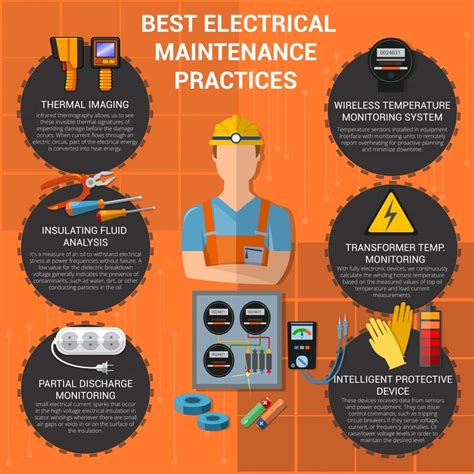As an electrical maintenance technician, your role is crucial in ensuring the smooth operation of electrical systems in various industries. Your expertise helps prevent electrical failures, reduces downtime, and guarantees the safety of people and equipment. In this article, we will explore the tips and best practices for success as an electrical maintenance technician.
The Importance of Electrical Maintenance
Electrical maintenance is essential for maintaining the reliability and efficiency of electrical systems. Regular maintenance helps identify potential problems before they become major issues, reducing the risk of electrical failures, and preventing accidents. Additionally, electrical maintenance ensures compliance with safety regulations and industry standards, protecting people and equipment from electrical hazards.
Key Skills for Electrical Maintenance Technicians
To succeed as an electrical maintenance technician, you need to possess a combination of technical skills, knowledge, and personal qualities. Some of the key skills required include:
- Strong understanding of electrical systems, including circuit analysis, electrical codes, and safety procedures
- Proficiency in troubleshooting and repair techniques
- Ability to work with a variety of electrical equipment, including circuit breakers, transformers, and motors
- Good communication and interpersonal skills for interacting with colleagues, supervisors, and clients
- Physical stamina for working in confined spaces, climbing ladders, and lifting heavy equipment
Tips for Success as an Electrical Maintenance Technician
- Stay Up-to-Date with Industry Developments: The electrical industry is constantly evolving, with new technologies and techniques emerging regularly. Stay current with industry developments by attending workshops, seminars, and conferences, and by reading industry publications.

-
Develop a Preventive Maintenance Schedule: A preventive maintenance schedule helps identify potential problems before they become major issues. Develop a schedule that includes regular inspections, testing, and maintenance tasks to ensure the reliability and efficiency of electrical systems.
-
Use the Right Tools and Equipment: Using the right tools and equipment is essential for efficient and safe electrical maintenance. Invest in high-quality tools and equipment, and ensure that you are properly trained in their use.
-
Follow Safety Procedures: Electrical maintenance can be hazardous, with risks including electrical shock, arc flash, and falls. Follow safety procedures, including lockout/tagout, personal protective equipment, and safe work practices, to minimize the risk of injury or death.
-
Continuously Improve Your Troubleshooting Skills: Troubleshooting is a critical skill for electrical maintenance technicians. Continuously improve your troubleshooting skills by practicing with different types of electrical equipment and systems.
Best Practices for Electrical Maintenance
- Use a Methodical Approach to Troubleshooting: A methodical approach to troubleshooting helps ensure that problems are identified and solved efficiently. Use a step-by-step approach that includes identifying symptoms, gathering information, analyzing data, and implementing solutions.

-
Keep Accurate Records: Accurate records are essential for tracking maintenance activities, identifying trends, and improving electrical system reliability. Keep accurate records of maintenance tasks, including dates, times, and details of work performed.
-
Communicate Effectively with Colleagues and Supervisors: Effective communication is critical for successful electrical maintenance. Communicate effectively with colleagues and supervisors, including providing clear and concise reports, and following established protocols.
-
Stay Organized and Manage Your Time Effectively: Electrical maintenance technicians often work on multiple tasks simultaneously. Stay organized and manage your time effectively by prioritizing tasks, using a schedule, and minimizing distractions.
-
Continuously Seek Feedback and Improvement Opportunities: Continuous improvement is essential for success as an electrical maintenance technician. Seek feedback from colleagues and supervisors, and identify opportunities for improvement, including additional training, new equipment, or changes to procedures.
Gallery of Electrical Maintenance Tips and Best Practices





FAQs
What are the key skills required for an electrical maintenance technician?
+The key skills required for an electrical maintenance technician include a strong understanding of electrical systems, proficiency in troubleshooting and repair techniques, and good communication and interpersonal skills.
What is the importance of preventive maintenance in electrical maintenance?
+Preventive maintenance is essential for identifying potential problems before they become major issues, reducing the risk of electrical failures, and preventing accidents.
What are the best practices for electrical maintenance technicians?
+The best practices for electrical maintenance technicians include using a methodical approach to troubleshooting, keeping accurate records, communicating effectively with colleagues and supervisors, staying organized and managing time effectively, and continuously seeking feedback and improvement opportunities.
In conclusion, as an electrical maintenance technician, your role is critical in ensuring the smooth operation of electrical systems. By following the tips and best practices outlined in this article, you can improve your skills, knowledge, and personal qualities, leading to success in your career. Remember to stay up-to-date with industry developments, develop a preventive maintenance schedule, use the right tools and equipment, follow safety procedures, and continuously improve your troubleshooting skills.
